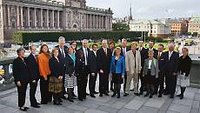 For those interested in my approach to the challenges we are facing in the world today, it might be interesting to read the speech I gave to the Swedish Institute for International Affairs on December 19th.
For those interested in my approach to the challenges we are facing in the world today, it might be interesting to read the speech I gave to the Swedish Institute for International Affairs on December 19th.The text can be found on the Ministry website on my own old one and on the site of the Institute.
Those interested can there also access the video version of the event.
The speech has been fairly widely commented upon in Sweden, although mostly in general appreciative terms without going too much into the substance.
But it does set out both my vision and my priorities. It combines optimism about the possibilities of globalisation with pessimism concerning the dark clouds gathering on the more immediate horizons of the neighbourhood of Europe.

